“I just make the most of all the opportunities that I can,” says two-time Paralympian Sharon Jarvis. It’s an ethos that has served the Australian para dressage mainstay well — and could possibly take her to a record third Games.
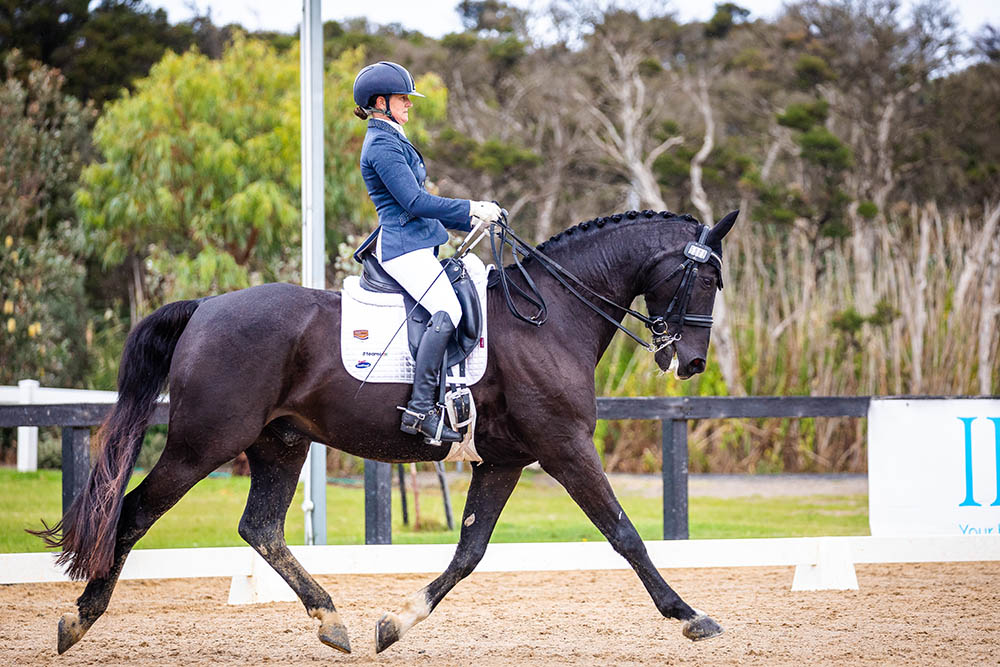
“The pair scored 75.258% in
the Freestyle Test.”
Sharon Jarvis and her new ride, 18-year-old gelding Romanos, have just pulled off a very successful — albeit cold — Australian Para Dressage Championships at Boneo Park, where they were crowned Grade IV champions. The pair scored 70.458% in the FEI Team Test (which is used for calculating team placings at international championships), 71.342% in the Individual Test, and 75.258% in the Freestyle Test. It was the first nominated Paralympic selection event this year on Australian soil, and the timing couldn’t have been better to get some good scores on the board.
“It’s definitely exciting, and I’m definitely pleased,” says Sharon of her performance. “[Due to Covid-19] it’s been such a long time since I’ve competed para and it’s been a long time between selection competitions. So we just really hoped that the training we’d been doing at home had paid off — which I think it certainly has. The horse and I are just getting to know each other more and more all the time, and I’m absolutely loving him to bits. I was very happy to present those scores!”
Getting back in the para dressage arena after a rather long break wasn’t the only challenge faced by competitors at the national championships — winter also came early to Victoria’s Mornington Peninsula. “The first day I got quite wet before entering the arena, but I seemed to manage a break in the weather for each test, which was lucky. I’m definitely not a fan of the cold at all; I was completely frozen to the bone. Some of the other riders did get some pretty atrocious weather for their tests, to the point where we were given the option of riding our Freestyle or not on the Sunday.
“For me, you’ve got to be prepared to compete in any sort of weather; you never know what you’re going to get when you’re out competing. Every time you ride, you’ll learn something new or you get better at coping with different things that go on, so that’s the way that I look at it.”
Sharon rode her Freestyle on the Sunday, and it wasn’t the easiest ride she’s had. “I was just pleased to get through it, as I was in quite a lot of pain that day. Just to stay on the horse was a miracle, and I was just pleased to get through the test. I had a good feeling as I was riding, and that’s all you can do and hope for really.” Although the test felt good, the score still came as a big surprise to Sharon — and she credits Romanos.
“He was such an absolute unicorn of a horse for me that day to cart me around in the condition that I was in. He was just amazing. It was definitely all credit to him that we pulled off that 75% test; I don’t think I can take credit for that ride!”
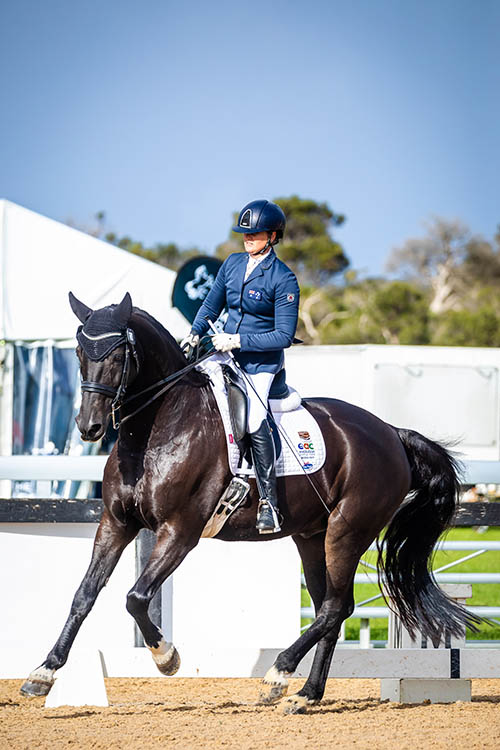
“She had only been partnered with
the horse for a few months when
she made her Paralympic debut.”
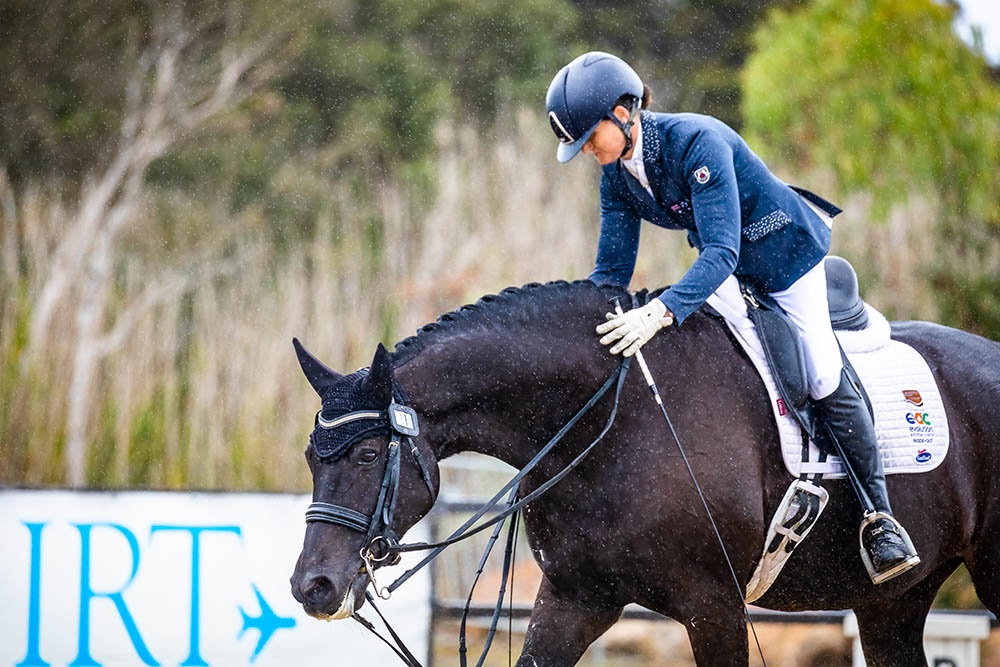
DEFYING THE ODDS
Hailing from Donnybrook, southwest WA, Sharon Jarvis has been in the saddle since she was three years old. By age four, her parents had bought her a horse so she could keep up with her older brother and sister who were also riding. At seven, she was diagnosed with a type of bone cancer, Ewing sarcoma, in her left femur and was given just three months to live. Defying the odds, Sharon survived — however, after breaking her weakened leg a year later and undergoing extensive surgery, she sustained loss of movement and strength in her lower left side. As her legs were not growing at the same rate, growth plates were stapled in her right knee, which means the lower part of her right leg has also been affected and suffers reduced movement and strength.
“The biggest thing that can affect me from day to day is the nerve pain,” says Sharon. “I have a normal daily level along with other pains, but if a bad attack happens it is about the only thing that can put me out of action for a bit.” It was this pain that rode with her during her Freestyle at the Australian Para Dressage Championships.
None of these setbacks has ever stifled Sharon’s desire to ride throughout her life. By 1992 she was competing, taking to the show ring and riding to Medium level dressage with success. In 2006, she was introduced to the world of para riding and in 2007 represented Australia for the first time at the FEI World Para Equestrian Dressage Championships in Gloucestershire, England, where competitors rode borrowed horses.
It was during her time in Europe for these World Championships that she found her next para star, Applewood Odorado. She had only been partnered with the horse for a few months when she made her Paralympic debut in 2008 at Beijing, where together they achieved fourth place in the Mixed Dressage – Championship Grade III (the para dressage grading system and championship tests have since changed). Next came the 2010 FEI World Equestrian Games in Lexington, USA, where she achieved two bronze medals in the Individual and Freestyle tests with her beloved ‘Odie’.
Sharon’s next appearance at a Paralympics came at Rio de Janeiro in 2016. With Odie retiring midway through their London 2012 selection campaign, a new horse by the name of Ceasy accompanied Sharon to Brazil. The KWPN mare was found through the help of Equestrian Australia and the Winning Edge Program, and Sharon gained the ride through syndication at the beginning of 2015 — just over a year out from the Games. A talented but tricky mare, they scored well and placed in the top 10 in the Individual Test.
“Rio presented an interesting situation for us with gunfire going off in the background before our test and me just being lucky to make it into the arena, so to come home with a top 10 placing in the Individual Championship Test, I was very happy with that,” recalls Sharon.
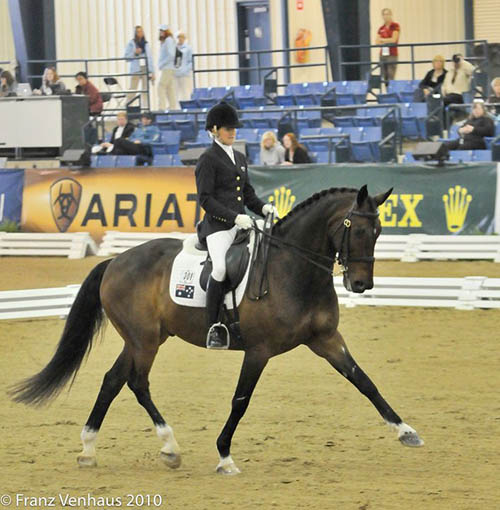
“Rozzie would not let me
drive out the driveway.”
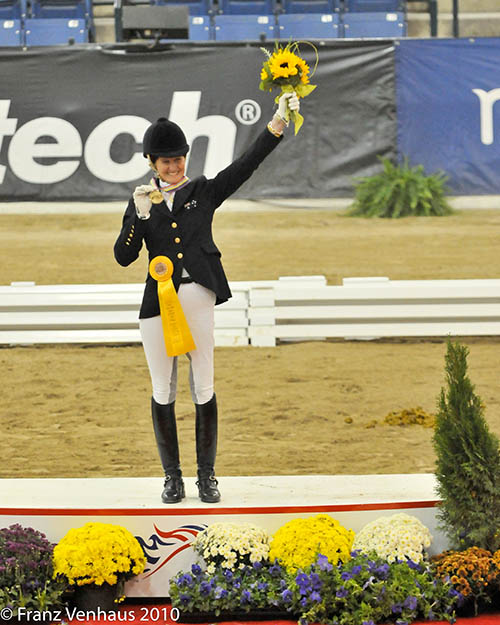
“I just knew when I sat on (Romanos)
that we had the potential.”
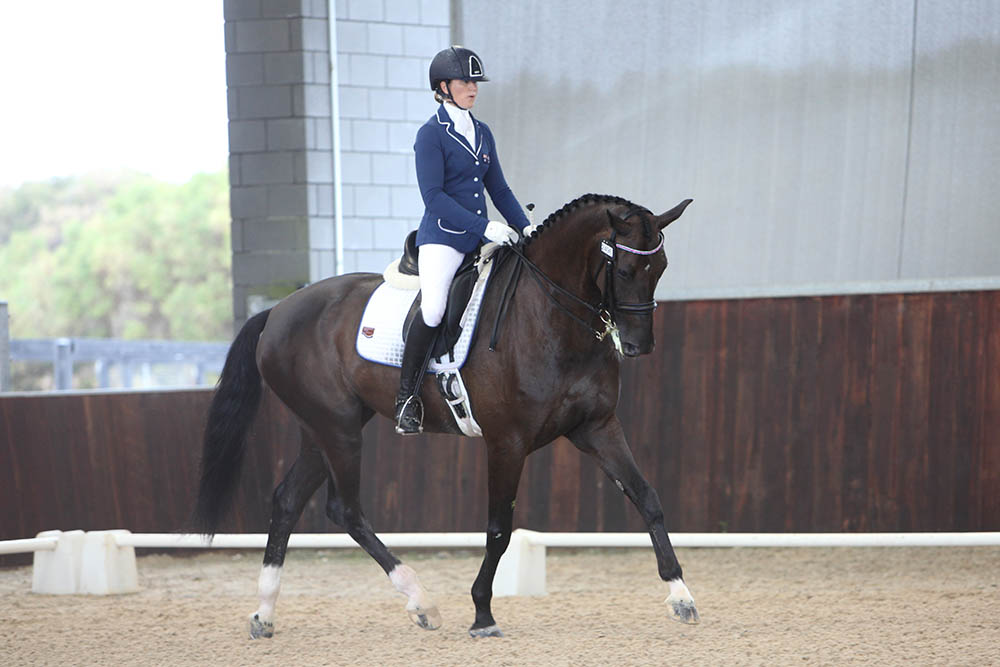
“We hit it off from the start.”
THE PATH TO TOKYO
When it comes to horses, things rarely go to plan — and Sharon knows this as well as anyone. Having had to pull Odie out of the Paralympic selection trials back in 2012, it was difficult to again be faced with a similar situation with Tokyo on the horizon.
Initially, it was chestnut Hanoverian and registered Arabian warmblood stallion Lord Larmarque who was penned as her possible Tokyo partner. Imported from Germany as a three-year-old by Kate Barton, and owned by Jade Edwards and Alan Moody of Westcoast Castle Equetrian, Sharon had ridden him since 2013. “I moved over from Western Australia to Ryans in NSW (Sharon is coached by Rozzie Ryan), to aim purely for Tokyo. We were going to campaign Lord Larmarque, but unfortunately he got an injury and we couldn’t guarantee a good lead up to the Games and so made a decision to not campaign him.” The Tokyo journey may be over for this handsome chestnut, but Sharon is still looking forward to continuing her partnership with him post-Tokyo. “Jade and Alan have been great supporters of mine for a long time and I look forward to continuing the ride on him after Tokyo.”
Although the loss of Lord Larmarque was further out than was the case with Odie in the lead up to London, with the Games not yet postponed at that point and no horse to ride, all hope seemed lost. “I honestly had no idea where I was going to pull another horse from. I said to Rozzie, ‘That’s it, I don’t think I’ve got anything left. I think I need to go home,’ but Rozzie would not let me drive out the driveway. She said, ‘You are not leaving yet, you’re not finished. We will make this happen!’”
Rozzie suggested Sharon put the call out via social media asking whether there was anyone who would have a horse to loan. “It was just going on the ultimate unicorn search, really,” says Sharon. “And we just had so many beautiful people offer horses that they thought might be suitable that we could try.”
Sure enough, a message came through from Donnella Merrett and Shaun Cooper of Gladstone in Queensland — Sharon’s unicorn had been found. “Rozzie looked at the message and said, ‘Right, that’s the horse that we need’. I got on a plane and went and had one ride on him and brought the video back to Rozzie. But you kind of know; honestly, I’ve found my other horses literally through one ride as well. I just knew when I sat on him that we had the potential to do what we needed to do,” recalls Sharon of her first meeting with Romanos. It wasn’t long before the gelding arrived at Ryans.
Donella and Shaun imported Romanos several years ago from Germany where he had competed at Small Tour level. Donnella took him through to Medium Tour, competing at national level and riding on the Queensland State Squad along the way. For Sharon, taking over the ride was a case of ‘right place, right time’.
“Donnella is a mother with a young son and she was busy with her businesses, and therefore Romanos wasn’t doing much, and so she had the ability to loan him. We hit it off from the start; he’s a little bit of a cheeky chap and has a great personality. He’s helped take my riding to the next level.”
Sharon did not know Donnella previously, and has been blown away by her generosity. “She’s just so incredibly generous and an absolutely lovely person. We keep in contact, sharing videos and photos. It’s just absolute generosity, and it’s exactly what our sport needs, because it can be difficult finding those incredible para horses.”
Sharon and Romanos really hit the ground running, achieving impressive scores at three Tokyo selection events before the pandemic struck. They attended the 2019 Australian Para Dressage Championships, achieving scores of 71.458% in the Team Test, 73.252% in the Individual Test, and a 74.875% in the Freestyle, and were crowned Grade IV champions. Next, they attended the Boneo Classic in January, 2020, where they scored 73.975% in the Team Test, 70.638% in the Individual Test and 71.042% in the Freestyle; they won the first two tests and placed second in the Freestyle. It was then on to the Tokyo Test Event, held at SIEC in March just a week prior to Covid-19 lockdowns, where they were again crowned Grade IV champions. Since then, there has been a big break due to the pandemic and of course the Paralympics have been postponed.
“Honestly, when the Games were postponed, probably my biggest fear was that I wouldn’t be able to keep the ride on Romanos for another year. But Donnella has allowed that to happen, which I’m just absolutely forever grateful for.” If Sharon is selected to compete at the Tokyo Paralympics, it will be an Australian record: no para dressage rider to date has competed for our country at three Games.
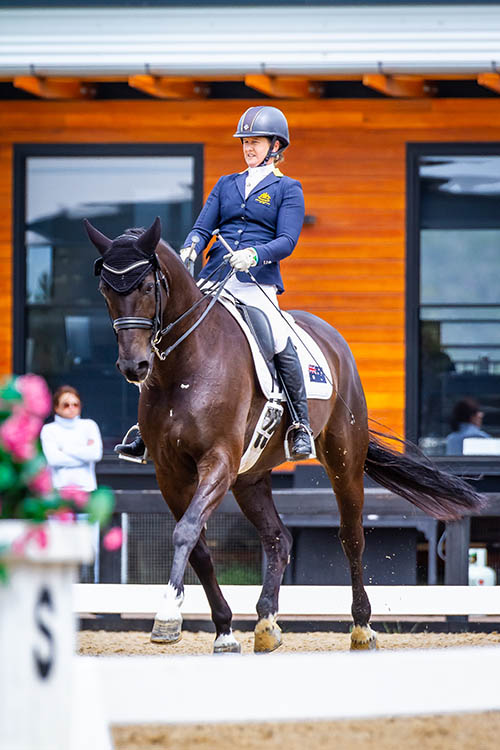
A SPECIAL MOMENT
Always making the most of opportunities, Sharon has embraced having the extra year based in NSW. “I was meant to be heading back to Western Australia after Tokyo, which would have been September last year originally. My attitude is always to make the most of every opportunity, and the postponed Games gave me the chance to head to Willinga Park this year, never having been there before.”
There were no para classes held at Dressage by the Sea in February, but that didn’t worry Sharon. “I just took the opportunity, grabbed it with both hands and really tried to make the most of it,” she says. She and Romanos rode in the Prix St Georges tests, scoring 62.147% the first week, and then the second week scoring 65.765% in the Inter I and 68.627% in the Prix St Georges — the latter placing the pair fifth in a big field against some of the nation’s top Small Tour horses.
“That second weekend, riding the Prix St Georges test, I think it’s a moment in time that I would love to relive forever. It all seemed to come together in that test. I was just so excited to put together the test that I had, and then to produce the placing that I did was honestly a very, very special moment in my life.”
Sharon had competed in Small Tour classes a few times previously, but they had always been a long way apart and she says she’s never really focussed on them due to her commitments in the para arena. “The Grade IV para tests are quite different compared to the Prix St Georges test. They are an Elementary level style of test, so the movements are not as difficult as the Prix St Georges, but the horse’s way of going — the balance and the cadence that’s required — needs to be more like a Small Tour horse. In saying that, the Grade IV para tests are quite tricky; the movements do come up really quickly.”
THE HOME STRETCH
“Our final Paralympic selection competition in Australia will be in conjunction with Sydney International Three-Day Event in May, so that’s our next competition,” says Sharon of her plans for the next couple of months.
“Competitions will keep taking place in Europe, for our long-listed combination there, so we have to sit tight until after they finish their competitions before being told if we’ve been selected on the team. We’ll just see what happens and hope for the best. I think I’ve put together a strong campaign, and we just have to hope that the selectors think that too.”
Following the selection event in May, Sharon will then head to a few local competitions where she can keep assessing how her training is going as she hopefully heads towards Tokyo. Whether she makes the team or not, there is little doubt that she’s left no stone unturned — and Sharon says she has her coach to thank for that. “I have to absolutely thank my coach Rozzie Ryan, because without her I honestly would not have achieved so much of what I have. She helps create the belief in myself that I can do it, and I’m very, very appreciative of that.”
AN EVOLVING SPORT
Although Tokyo remains Sharon’s main focus, she is already thinking of the next chapter in her life — and it still involves the sport she loves. At the beginning of the year she was appointed Equestrian Australia’s new Para Equestrian Pathways Co-ordinator. “It’s really exciting, because it’s not a role that has been available previously. I also think it’s quite exciting being the first person with a disability to be employed by our national sporting organisation to be involved with the actual sport. I think that produces a really incredible opportunity to make a difference within the sport.
“At the moment, it’s a lot of background work. In the future it’ll involve more to do with the lower levels of high performance and trying to get riders to make the transition from grass roots into a high performance sport. After my Tokyo selection campaign, it’s something I will be able to really grasp with both hands and get involved in more, and take forward in a great direction in terms of talent identification and talent development. The aim is that in the future, those riders identified can then lead into the high performance end of the sport.
“This sport is definitely my passion, and to be able to work with my passion, I don’t think you can ask more of that out of the job. I think it’s scary how long it has been since I first got involved in para dressage; since 2006, I have seen a lot of change and a lot of development, and I really look forward to where that can go in the future!” EQ

